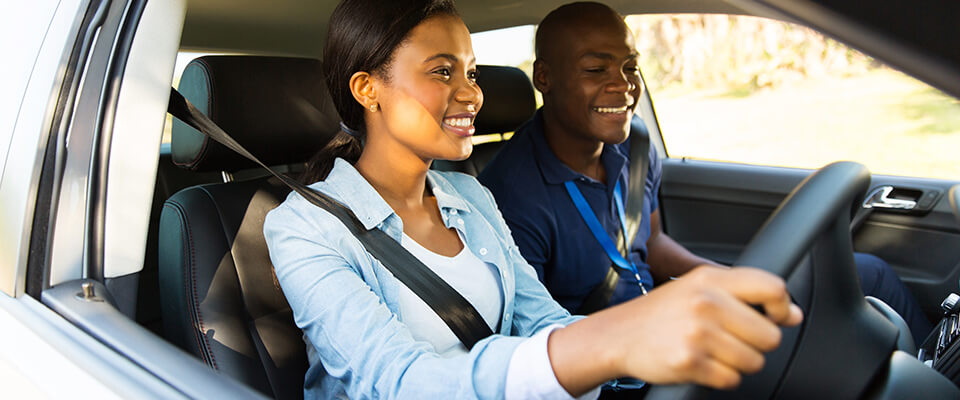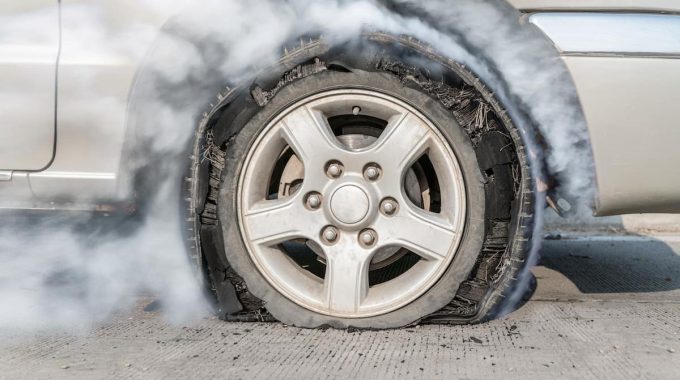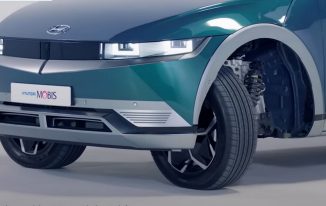First, you hear a loud BOOM, then a sudden jolt and a pull to the side. At highway speeds, a blown tire can easily cause a new driver to panic and lose control. Based on the National Highway Traffic Safety Administration, tire blowouts cause more than 75,000 crashes and kill more than 400 drivers yearly. Yikes! Before those numbers send a shiver down your spine, know that a flat tire doesn’t have to spell disaster, even if you’re not a professional stunt driver.
If you follow a few simple tips, almost anyone can regain control after a flat tire. Here’s everything you need to know to survive a tire blowout(and how to avoid one in the first place).
Surviving a Blowout
- Stay Calm

Stay Calm While Driving The best thing you can do in the first moments after your tire blows are absolutely nothing. Don’t take your foot off the gas, step on the brakes or turn the steering wheel. Any of these actions could make you lose control of the vehicle and spin out suddenly. Take a deep breath and don’t panic.
- Steer Straight
If your tire blows out, you will feel the car pull to the side. Keep a firm grip on the wheel with both hands at 10 and 2. You may feel the car start to lurch or wobble but you must resist the urge to turn the wheel sharply and overcorrect. Do your best to drive the vehicle straight.
- Gently Press the Gas Pedal
It may feel counterintuitive but accelerating slightly after a tire blowout can help you regain control of the vehicle by retaining your forward momentum. Once you regain control of the vehicle, slowly ease off the gas pedal.
Remember: the worst thing you can do after a tire blowout is to hit the brakes.
- Allow the Car to Slow Itself
A blown tire acts like a parachute and naturally slows down your speed. Then, either you or a passenger can turn on the emergency lights as you will quickly slow down to below-cruising speed. Try to keep the vehicle straight and do not turn the steering wheel.
- As Soon as Your Speed Drops Below 30 Mph, Gently Step on the Brake
Once you have reduced your speed to a safe level, about 20 mph, you can slowly turn the steering wheel to guide your vehicle off the road. When you are out of traffic, catch your breath and call for assistance.
Avoiding a Blowout
- Double Check Tire Pressure Early and Often

Check Your Tire Pressure Regularly Prevention is the best strategy when it comes to tire blowouts. Most blowouts are the result of incorrect tire pressure. In the U.S., cars sold after 2007 must be equipped with an electronic tire pressure monitoring system that alerts you when air pressure goes below or above a safe level. If you have an older vehicle, you must monitor it yourself.
Check the tire pressure before going on longer trips (find out the recommended tire pressure for your vehicle). This is particularly essential in the summer when the pavement temperature can rise and cause your tire pressure to rise to burst levels. If you feel your tires are “off” or you have a tire pressure warning light on while in Melbourne, Laverton or Dandenong South, head to Star Truck Tyres to take advantage of a complete tire checkup and repair service. Getting your tires inspected at the first sign of trouble is the best way to avoid a blowout.
- Don’t Drive on Old, Worn Tires
If you drive in the summer heat with worn tires, you are looking for trouble. If there are cracks in the rubber or the tread on your tires is worn, you could seriously damage your rims and vehicle. If you think you won’t check your tires regularly (because hey, we’re all busy), you may want to choose a set of tires that does work for you. Some tires are uniquely engineered with a high-tech cooling system that evenly distributes heat to help maintain safe tire pressure and prevent a blowout, even in extreme conditions.
The bottom line? High-quality tires and a little bit of due diligence can prevent most blowout situations. If you have an inkling that your tires may be “off,” visit Star Truck Tyres.




